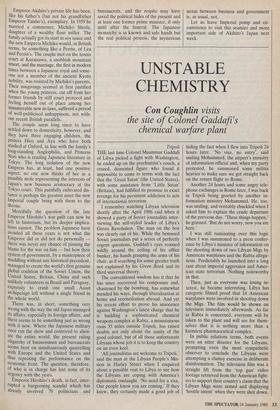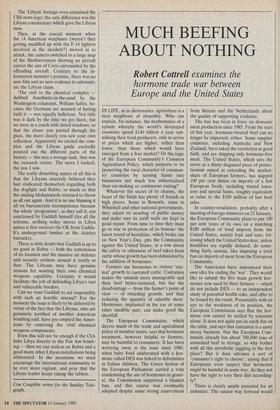UNSTABLE CHEMISTRY
Con Coughlin visits
the site of Colonel Gaddafi's chemical warfare plant
Tripoli THE last time Colonel Muammar Gaddafi of Libya picked a fight with Washington, he ended up on the psychiatrist's couch, a crazed, demented figure who found it impossible to come to terms with the fact that the 'Great Satan' (the United States), with some assistance from 'Little Satan' (Britain), had fulfilled its promise to exact revenge for his persistent addiction to acts of international terrorism.
I remember watching Libyan television shortly after the April 1986 raid when it showed a party of Soviet journalists inter- viewing the self-styled leader of Libya's Green Revolution. The man on the box was clearly out of his. While the bemused Soviet journalists put a series of perfectly cogent questions, Gaddafi's eyes roamed wildly around the ceiling of his office bunker, his hands grasping the arms of his chair, as if searching for some greater truth not explained by his Green Book and its third universal theory.
The conventional wisdom has it that he has since recovered his composure and, chastened by the bombing, has somewhat mended his ways, through liberalisation at home and reconciliation abroad. And yet his recent effort to prove his innocence against Washington's latest charge that he is building a sophisticated chemical weapons complex at Rabta, a mountainous oasis 35 miles outside Tripoli, has raised doubts not only about the sanity of the good colonel, but of all those unfortunate Libyans whose job it is to keep the country on an even keel.
`All journalistas are welcome to Tripoli,' said the man at the Libyan People's Mis- sion in Harley Street when I enquired about a possible visit to Libya to see how the Libyans are coping with America's diplomatic onslaught. 'No need for a visa. Our people know you are coming.' If they knew, they certainly made a good job of hiding the fact when I flew into Tripoli 24 hours later. 'No visa, no entry', said smiling Mohammed, the airport's ministry of information official and, when my party protested, he summoned some militia heavies to make sure we got straight back on the return flight to Rome.
Another 24 hours and some angry tele- phone exchanges in Rome later, I was back in Tripoli being greeted by another in- formation ministry Mohammed. He, too, was smiling, and veritably chuckled when I asked him to explain the crude departure of the previous day. 'These things happen,' he grinned. 'But do not worry, now you are here.'
I was still ruminating over this logic when I was summoned to a press confer- ence by Libya's minister of information on the shooting down of two Libyan Migs by American warplanes and the Rabta allega- tions. Predictably he launched into a long rant about imperial aggression and Amer- ican state terrorism. Nothing noteworthy in that.
Then, just as everyone was losing in- terest, he became interesting. Libya has categoric filmed proof that 14 American warplanes were involved in shooting down the Migs. The film would be shown on television immediately afterwards. As far as Rabta is concerned, everyone will be taken to the plant and will see for them- selves that it is nothing more than a harmless pharmaceutical complex.
In public relations terms, both events were an utter disaster for the Libyans, prompting even the most sympathetic observer to conclude the Libyans were attempting a clumsy exercise in deliberate disinformation. The television film was a straight lift from the 'top gun' video footage retrieved from the American fight- ers to support their country's claim that the Libyan Migs were armed and displaying `hostile intent' when they were shot down. The 'Libyan' footage even contained the CBS news logo; the only difference was the Libyan commentary which gave the Libyan view.
Then, at the crucial moment when the 14 American warplanes (weren't they getting muddled up with the F-14 fighters involved in the incident?) moved in to attack, the camera switched to a large map of the Mediterranean showing an aircraft carrier the size of Crete surrounded by the offending aircraft. Contrary to the in- formation minister's promise, there was no new film and no new evidence to substanti- ate the Libyan claim.
`The visit to the chemical complex dubbed Auschwitz-in-the-sand by the Washington columnist, William Safire, be- cause the Germans are accused of having built it — was equally ludicrous. Not only was it dark by the time we got there, but we were in a coach with tinted windows, so that the closer you peered through the glass, the more clearly you saw your own reflection. Apparently we circled the com- plex and the Libyan guide excitedly pointed out the different parts of the factory — this was a storage tank, that was the research centre. The more I looked, the less I saw.
The really disturbing aspect of all this is that the Libyans sincerely believed they had vindicated themselves regarding both the dogfight and Rabta, so much so that the smiling Mohammeds returned to throw us all out again. And it is no use blaming it all on bureaucratic incompetence because the whole 'programme', as they call it, eas sanctioned by Gaddafi himself (for all the reforms, nothing today moves in Libya unless it first receives the OK from Gadda- fi's underground bunker at the Aziziya barracks).
There is little doubt that Gaddafi is up to no good at Rabta — both the remoteness of its location and the massive air defence and security cordons around it testify to that. The Libyans may have genuine reasons for wanting their own chemical weapons capability. Certainly it would facilitate the job of defending Libya's vast and vulnerable borders.
Can we trust Gaddafi to act responsibly with such an horrific arsenal? For the moment the issue is likely to be deferred by virtue of the fact that the Libyans, who are genuinely terrified of another American bombing raid, have pre-empted the Amer- icans by removing the vital chemical weapons components.
Even this will not be enough if the CIA links Libya directly to the Pan Am bomb- ing — then we can reckon on Rabta and a good many other Libyan installations being obliterated. In the meantime we must encourage the international community to be ever more vigilant, and pray that the Libyan leader keeps taking the tablets.



















































 Previous page
Previous page